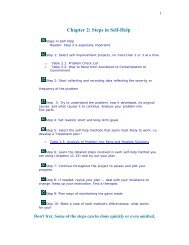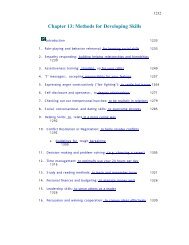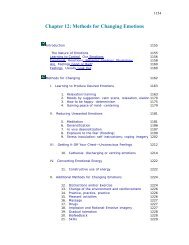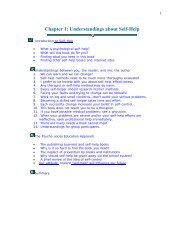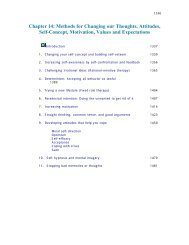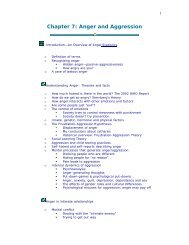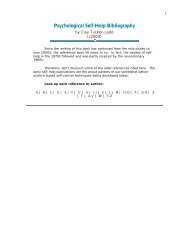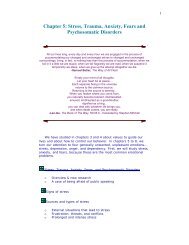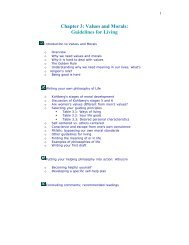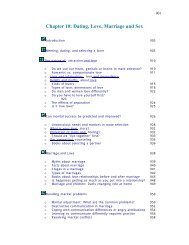Methods for Changing Behaviors - Psychological Self-Help
Methods for Changing Behaviors - Psychological Self-Help
Methods for Changing Behaviors - Psychological Self-Help
You also want an ePaper? Increase the reach of your titles
YUMPU automatically turns print PDFs into web optimized ePapers that Google loves.
Even if it is done gradually, it isn't easy to learn to eat, smoke,<br />
worry, etc. in one place. There are so many old stimuli that are<br />
conditioned to produce the unwanted response; they are hard to<br />
break. On the other hand, pairing a desired response (study, positive<br />
beliefs) with a new stimulus or environment is not hard, but it is<br />
tedious to remember to do.<br />
Effectiveness, advantages, and dangers<br />
Intuitively, the efficacy seems to depend on the problem and the<br />
method. It is effective to study or work in one place--after about a<br />
month or so of daily experience. Yet, it would take more than<br />
controlling responses in the grocery store to restrict the diet of most<br />
hungry midnight raiders (who can down a quart of low fat yogurt), but<br />
controlling responses can help. However, my experience with classes<br />
suggests that only a few people use conditioning procedures to change<br />
habits or attitudes.<br />
Relapse prevention; temptation resistance training; cue exposure<br />
One of the hardest parts of self-control is stopping some<br />
unwanted, but compelling behavior. Once stopped, then there is the<br />
problem of staying in control. For this reason a section of chapter 4<br />
was devoted to the crucial step of preventing relapses. Read that<br />
section, it is important. Coverage here will, there<strong>for</strong>e, be brief.<br />
The basic approach is to avoid the stimuli that produce the<br />
unwanted response (method #1) or, the opposite, to confront the<br />
tempting situation repeatedly without responding in the undesired way<br />
(methods #2 ); thus, reducing the habit's control over you.<br />
The drop out rate from treatment and exercise programs is high,<br />
often 50% or 60% in the first three months. The relapse from weight<br />
loss and alcohol or drug treatment programs is notorious, maybe 90%<br />
or more. Maintaining our gains in self-control is a serious problem. But<br />
we are learning much more about relapse prevention and research<br />
shows that adding these techniques to other methods, such as<br />
treatment <strong>for</strong> obsessions or compulsions, significantly improves the<br />
outcome.<br />
Purposes<br />
· To break the grip that certain urges have over our behavior.<br />
Examples: the urge to drink, to smoke, to gamble, to<br />
masturbate, to be excessively concerned with or to avoid work<br />
or responsibilities, to over-eat, to be compulsively clean and<br />
organized, to shop, etc. (Compulsions and obsessions are dealt<br />
with in chapters 5 & 12 because they are primarily ways of<br />
handling anxiety, not just simple behaviors.)<br />
1085



